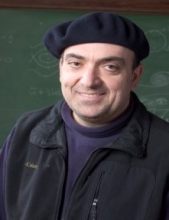MAE Seminar: Physics-informed Neural Networks (PINNs) for Fluid Mechanics and Beyond

Abstract: Karniadakis will present a new approach to developing a data-driven, learning-based framework for predicting outcomes of physical and biological systems and for discovering hidden physics from noisy data. We will introduce a deep learning approach based on neural networks (NNs) and generative adversarial networks (GANs). We also introduce new NNs that learn functionals and nonlinear operators from functions and corresponding responses for system identification. Unlike other approaches that rely on big data, here we “learn” from small data by exploiting the information provided by the physical conservation laws, which are used to obtain informative priors or regularize the neural networks. We will also make connections between Gauss Process Regression and NNs and discuss the new powerful concept of meta-learning. We will demonstrate the power of PINNs for several inverse problems in fluid mechanics, solid mechanics and biomedicine including wake flows, shock tube problems, material characterization, brain aneurysms, etc, where traditional methods fail due to lack of boundary and initial conditions or material properties.
Bio: Karniadakis received a master's degree and doctorate from the Massachusetts Institute of Technology. He was appointed lecturer in the Department of Mechanical Engineering at MIT in 1987 and subsequently joined the Center for Turbulence Research at Stanford / Nasa Ames. He joined Princeton University as assistant professor in the Department of Mechanical and Aerospace Engineering and as associate faculty in the Program of Applied and Computational Mathematics. He was a visiting professor at Caltech in 1993 in the Department of Aeronautics and joined Brown University as associate professor of applied mathematics in the Center for Fluid Mechanics in 1994. After becoming a full professor in 1996, he continues to be a visiting professor and senior lecturer of ocean/mechanical engineering at MIT. He is a fellow of the AAAS, the Society for Industrial and Applied Mathematics (SIAM), the American Physical Society, the American Society of Mechanical Engineers, and an associate fellow of the American Institute of Aeronautics and Astronautics. He received the Alexander von Humboldt award (2017), the Ralf E Kleinman award from SIAM (2015), the J. Tinsley Oden Medal (2013) and the CFD award (2007) from the U.S. Association in Computational Mechanics. His h-index is 101 and he has been cited over 50,500 times.
Share
Upcoming Events
-
MSE 298 SEMINAR: Grain Boundary Engineering in Nanoceramics
-
MAE 298: On Certain Foundational Issues in Feedback Theory
-
CBE 298 Seminar: Electrochemical Revalorization of Biosolids and Nutrients Recovery
-
MSE 298 SEMINAR: The Interphase in Nanostructured Polymers - Coupled Experiment-Computational Approach and Machine Learning for Interphase Design
-
MSE 298 SEMINAR: Multiscale Modeling of Electrified Interfaces in Batteries
